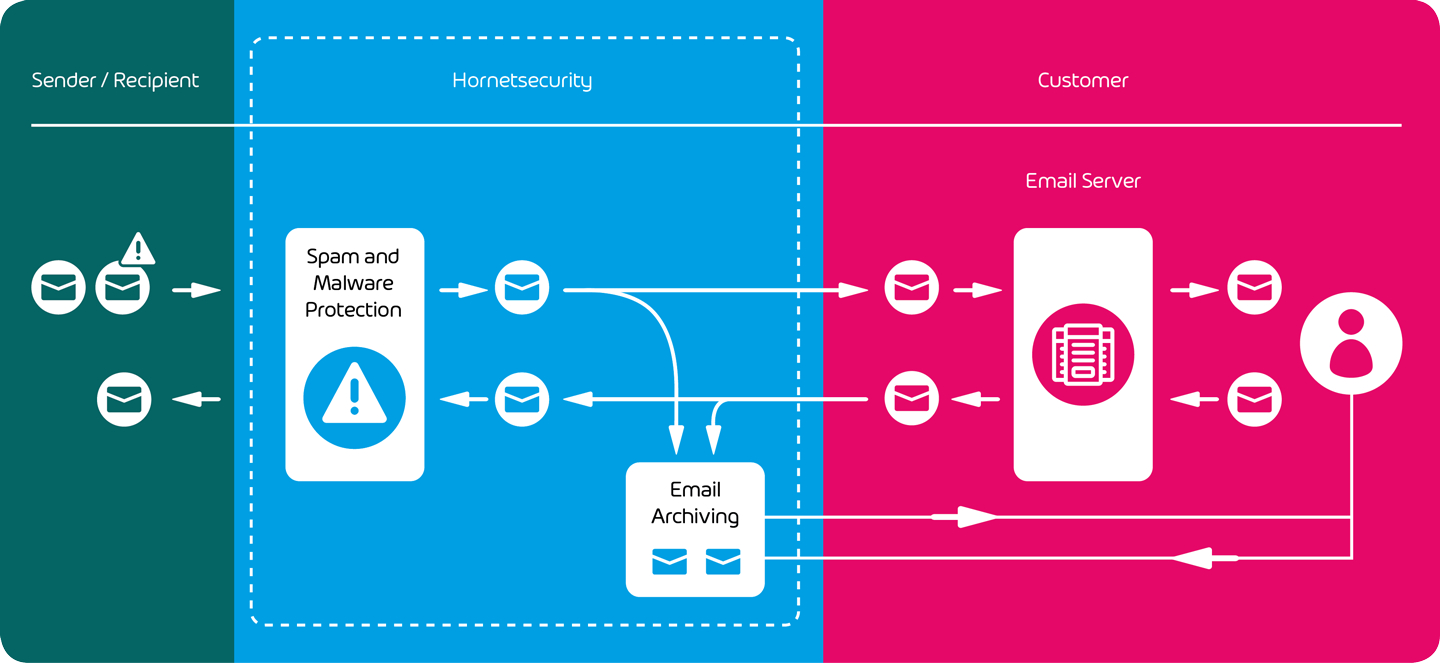

Legally compliant, fully automated and audit-proof email archiving. For long-term, unchangeable and secure storage of important company information, data and files.
Email is the most widely used and relevant communication tool on the Internet. Electronic exchange of sensitive data and files is an efficient and quick way for companies to communicate. According to the GoBD, business emails must be archived for a certain retention period and be available for the relevant authorities to inspect. Secure and reliable storage is also essential for later access to important information. Fully automatic and secure archiving can be an enormous relief from the burden on company productivity that comes from this need to correctly store all that data.
Why Does A Company Need Cloud-Based Email Archiving?

Retrieval and recovery of archived emails
If a user’s emails are accidentally deleted from the mail server, they can be restored from the archive – at any time with the simple push of a button.

Fully automated and 100% secure cloud archiving
Automatic archiving of all incoming and outgoing email messages eliminates the need for administrators to perform archive-related tasks. In the cloud, all data is stored securely, unalterably and completely.

Automatic archiving: unaltered and unalterable
In accordance with audit-proof archiving, all incoming and outgoing emails are stored automatically and in their original form in Hornetsecurity’s data centers immediately upon arrival and dispatch. This ensures that no important documents are lost and archiving is complete. They cannot be edited or deleted before the set retention period has expired.
All archived emails are securely stored in encrypted databases in certified and secured data centers.
Hornetsecurity Email Archiving Features
For example, union messages are excluded from automatic email archiving in order to comply with data protection guidelines.
In addition to outgoing and incoming emails, internally sent and received emails can also be archived. These are provided via the journaling function of the mail server and are also stored in their original unalterable form.
If supported by the mail server, data is encrypted via TLS during transmission in order to protect against changes in content and attached files.
Different retention periods apply to different types of business emails. Standard business emails have to be kept for six years, accounting receipts or invoices have a ten-year period. Applicant data received by email, on the other hand, must be deleted at the end of the application process. Set the archiving period to anything between 6 months and 30 years.
12 Benefits of The Easy Management of Email Cloud Archiving
In the daily flood of emails, it can be difficult to keep track of messages. Good search algorithms are needed to find messages and redisplay them without problems. In addition, it must be possible to limit and target the search using various search parameters. This is possible thanks to the comprehensive search functions within email archiving.
The full text index makes it very easy to find the emails and attachments you are looking for. All archived messages are fully indexed so that the search time is correspondingly short.
Not only the full text search can be used to find archived emails – search parameters can be narrowed down by individual search criteria such as date, sender, recipient and subject, and searched messages can be identified more precisely and found more quickly.
The same legal requirements apply to business emails as to traditional letters. They must be kept and retained for a certain period of time. In addition, it must be ensured that an auditor can access the emails at any time.
An email archive must be accessible for auditing at all times. Audit access is provided for this purpose, giving the auditor extended read rights to the stored emails of a specific domain, which can be set up by the IT administrator. Audit access allows the auditor access to the archive for a limited time. Once the audit is complete, the administrator has access to the audit log, in which he can see what data has been viewed.
A complete log is kept of all access to the email archive, especially when settings such as retention periods are changed. The protocol contains, among other things, the login name and IP address of the user and it cannot be edited or deleted. The audit log can be viewed by the administrator at any time.
In order to prevent misuse of the archived email data of individual users, administrators do not have access to archived user emails. They can only see the metadata, not the content.
A user can give another user access to his email archive. Practical for absent or retired employees.
The entire email archive can be exported easily at any time. Customers can either do this themselves, or alternatively Hornetsecurity can carry out the export for a fixed price.
Emails and their attachments can be imported from other databases into Hornetsecurity’s email archive, whether in .pst or Outlook format. This makes it easy to re-archive older emails.
If a user is given a new email address, the archived messages can be assigned to this new address so that the user can continue to access the data.
Emails that end up in Hornetsecurity’s email archive are saved in their original format, regardless of the encoding. This applies to different languages and characters as well as to encrypted messages.
12 Benefits of The Easy Management of Email Cloud Archiving
Archiving takes place immediately upon receipt and sending of emails. This prevents manipulation of the individual messages. In order to guarantee the functionality and efficiency of email archiving, integration of spam and malware protection is required.
